Robbo: Lance Franklin arrived in the AFL a skinny, prodigiously talented youngster who quickly became a rock star
He didn’t help win the Swans a flag, but Lance Franklin was a bigger drawing card than even Tony Lockett. Mark Robinson looks at his incredible career.
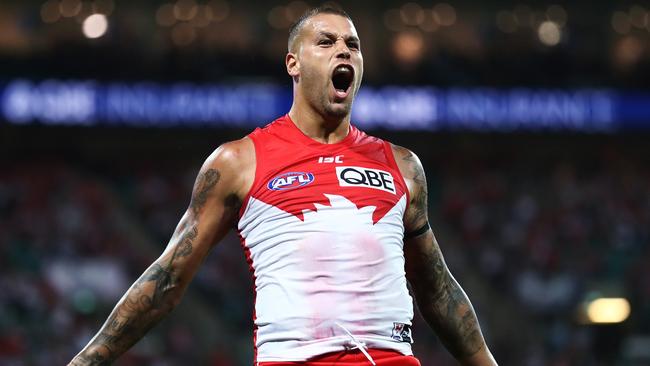
AFL
Don't miss out on the headlines from AFL. Followed categories will be added to My News.
Lance Franklin arrived like a whirlwind, a skinny, prodigiously talented young fella from the west who would explode and transfix the footy world.
What a player. No, what a performer.
He was truly box office, like Wayne Carey and Gary Ablett Snr before him and John Coleman way before TV, and Dusty Martin most recently.
Players retire every year, but it can only be said of a very few, that you wish they could go on forever.
He didn’t get the fairytale end, but it must be said, Franklin’s entire career was the fairytale. All 20 years of dazzling exploits which left fans smiling and opponents trembling.
If your team played Hawthorn or Sydney, watching Buddy play was the bonus. If you barracked for the Hawks or the Swans, how blessed you were.
It’s easy to say there won’t be a player like him again, but that’s not true. Football has a habit of unearthing greatness. But to have a player with the package of height, athleticism, speed, ball handling, depth of kick, the caress of kick and a panache dripping with self-confidence and audaciousness is the rarest of packages.
If he wasn’t a footballer, he could’ve been a hell of a 200m, 400m or even a 1500m athlete.
From the start, Franklin believed he could do anything on a footy field. That’s a rock-star attitude.
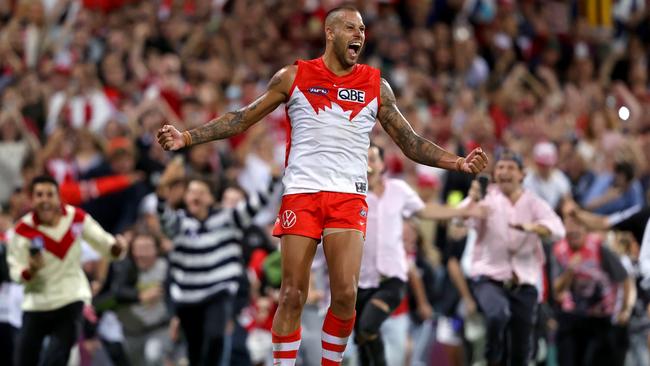
And imagine if he could’ve marked the ball — one grab and vice-like — like Stephen Kernahan, or Tony Lockett, or Jason Dunstall?
He would be retiring today not regarded as one of the best of all time, but the greatest player of all time. At a pinch, you could argue the latter. He kicked 1000-goals in an era of defensive floods, double-teams and third man-up, and always when the opposition knew the ball was going to him. Still, he prevailed.
He had a key forward body with a half-forward mindset.
The “bubble’’ football helped Franklin. With coaches wanting the game to be played in a 70m blanket, Franklin would push high up the ground and then destroy teams on the surge back towards goal.
He could run all the way, just ask Essendon’s Cale Hooker, or he could gather the ball from between wing and half-forward and pop 70m drop punts to the vacant goalsquare, for he was never a torpedo kicker.
He would leave opponents out of reach and out of breath and mostly everyone else out of words.
Mostly.
He was both exhilarating and fascinating and try to say that in Bruce McAvaney tones.
And how can we forget Huddo’s call of “thirteeeeeeeen, thirteeeeeeeen’’ in Tasmania? It’s footy folklore.
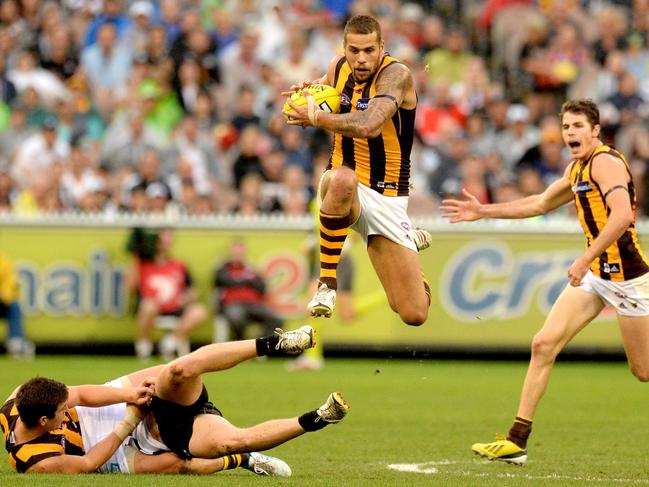
My two favourite goals were 1) when he jumped over Collingwood’s Sam Dwyer in the middle of the MCG and goaled from 75m and 2) the run, turn, gather, without breaking stride, and kicking the goal with the outside of the boot against Chris Tarrant in the 2011 preliminary final.
There were more important goals, such as his 100th in 2008 against Carlton aged 22 and his matchwinning goal, his seventh that day, against Adelaide in the 2007 elimination final.
And his 1000th goal at the SCG last year was truly momentous.
The year he was drafted, 2004, saw the arrival at Hawthorn of Franklin, Jarryd Roughead and Jordan Lewis, the three knockabouts from rural Australia.
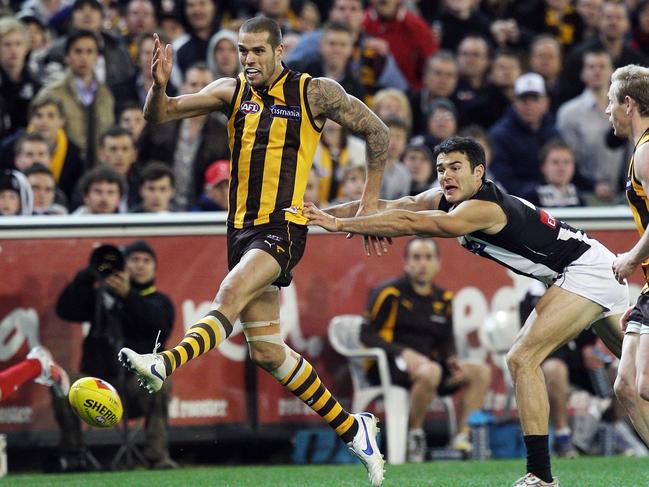
They remain great mates. The trio shared a text exchange on Sunday after Franklin tore a calf muscle on Saturday night.
“I’m done,’’ Franklin text. “The results from calf are not good.’’
Lewis text back: “It’s been a hell of a ride.”
Lewis said on Monday: “It was Roughy, Buddy and I … yeah, you want it to last forever don’t you. Even when he’s achieved what he’s achieved in the game, you don’t want it to end.”
“Joey Montagna said it best. We chair players off for 200 games, this bloke deserves a cavalcade for the career he’s had and the joy he’s brought to the people and the game,” Lewis said.
“If it’s up to him, he’ll probably want to do nothing but we need a full-stop on his career.’’
Lewis and Roughead retired in 2019 and Franklin survived another four more years. If not for the calf tear, it could’ve been another season. Franklin was open-minded about playing next year, more open-minded than Sydney to be honest.
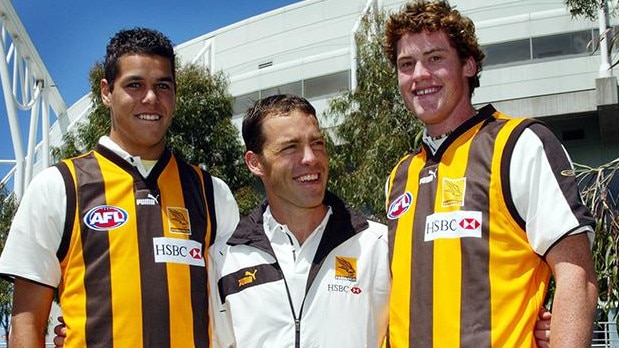
Franklin’s first game was against Sydney in 2005 but it was in his second game, against Richmond at the MCG, when Franklin announced himself. He was all arms and legs, like a baby giraffe, and he kicked 3.2 wearing the No. 38 jumper.
A rock star had arrived, although he preferred to shun the rock star adulation. Lewis said it was a nightmare going out with him socially.
“He was mobbed. Everyone from grandparents wanting to get photos for their grandchildren, parents wanting to get photos for their children, children wanting to get photos to show their parents … he crossed all generations,” Lewis said.
“He reckoned every game this year an opposition player has asked for his jumper.’’
That powerful appeal — and his ability — made him perfect for Sydney.
It remains one of the fully untold stories about why Franklin wanted to leave Hawthorn, and his relationship with coach Alastair Clarkson through that time, suffice to say the Swans swooped when everyone including an exasperated GWS and AFL officials had Franklin earmarked for the Giants.
Was it a success for Sydney?
The Swans scoff at the question. He didn’t help win the Swans a flag, but he was a bigger drawing card than even Tony Lockett.
Thanks for making us smile, Buddy.
More Coverage
Originally published as Robbo: Lance Franklin arrived in the AFL a skinny, prodigiously talented youngster who quickly became a rock star





